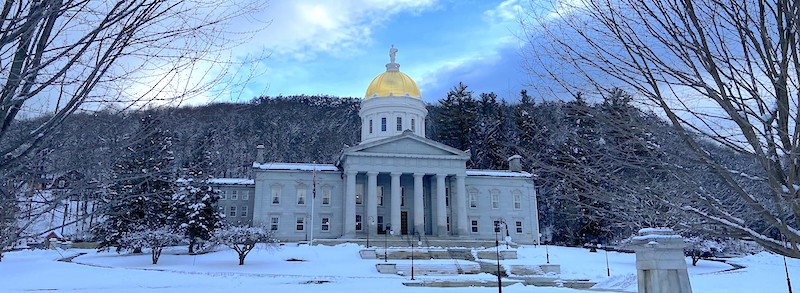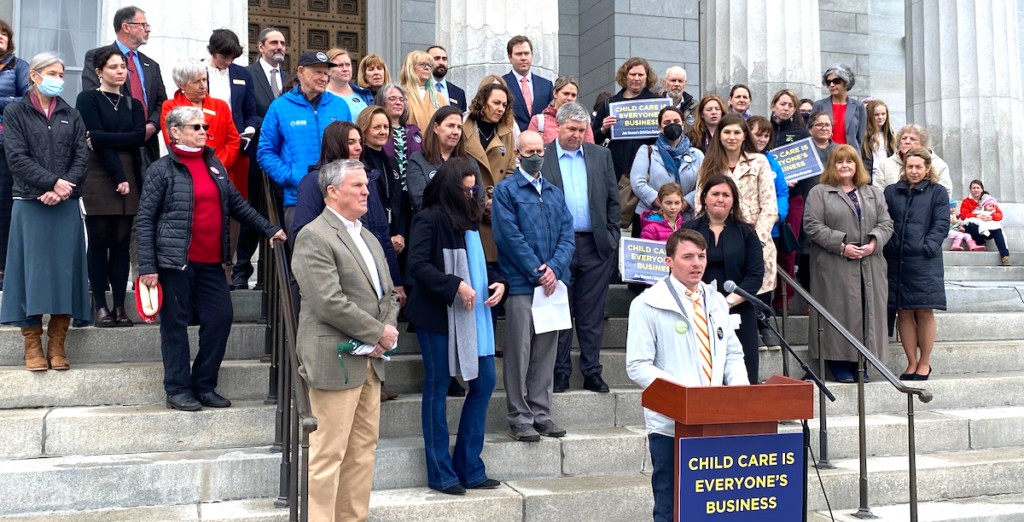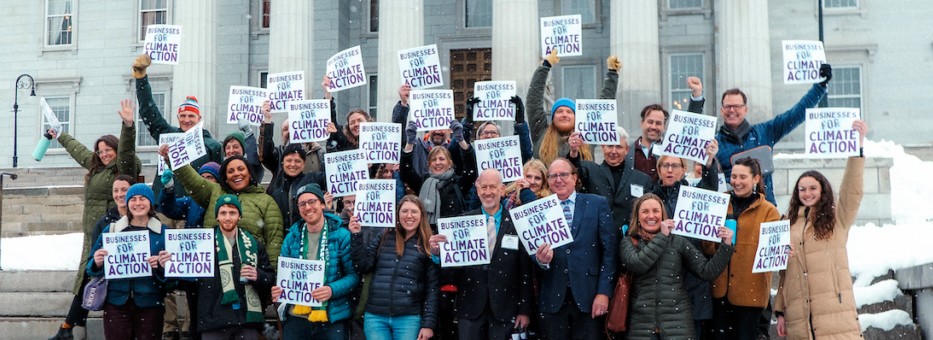VBSR’s 2024 Legislative Priorities

VBSR’s mission is to leverage the power of business for positive social and environmental impact. We advance our mission through shared learning, connection-building, and collective action. For over 30 years, we have harnessed the power of the business community to galvanize change in the Vermont State House and drive our state toward a new paradigm—a just, thriving, and transformative economy for all people and the planet.
In support of this vision, each year VBSR selects a few policy priorities to focus on during the annual legislative session. In 2024 these priorities will be:
- Housing: Creating Strong Community Foundations
- Care Economy: Stable Families, Stable Workforce – Building an Economy that Works for Everyone
- Climate and Clean Energy: Building for Our Future
- Healthcare: The Intersection of Economics and Wellbeing
These priorities have been democratically developed, beginning with input from our membership through two separate membership surveys, then with extensive discussion among members of VBSR’s Public Policy Committee, and ultimately the approval of VBSR’s Board of Directors.
Below is an overview of each issue, key legislation, and the proposed level of support. VBSR may serve as either a Champion (steering committee, testify, member mobilization, public support/leadership, staff lobby time), Coalition Member (participate in strategy, mobilize members where possible, track issues, staff lobby time, public support), or Supporter (Public support, track issues for members). In the coming weeks, we will offer more substantive issue briefings on our legislative priorities, along with providing our members tangible ways to engage in the advancement of our policy goals.
The priorities listed below have been democratically developed, beginning with input from our membership through two separate membership surveys, then with extensive discussion among members of VBSR’s Public Policy Committee, and ultimately the approval of our Board of Directors.

Housing: Creating Strong Community Foundations
- VBSR Role – Champion: Steering Committee, testify, member mobilization, public support/leadership, staff lobby time
The nexus between economic stability and housing remains clear. Housing has significant impacts on many sectors of the economy including workforce housing, construction, mortgage brokers, transportation, and heating and cooling, to name a few.
Housing stock continues to decline in Vermont, with a 1.65% decrease in new homes built since 2020. More than one-quarter of our state’s housing structures were built before 1940, and only 0.5% of Vermont’s housing stock was constructed after 2014. These figures highlight a near halt in new development and construction, thus indicating the clear need for new residential structures. VBSR will engage with lawmakers, environmentalists, and municipalities to thoughtfully adjust ACT 250 as a tool for strategic housing growth in downtown centers across Vermont.
The lack of adequate housing stock in Vermont costs both employers and employees. Some households will seek alternative employment opportunities when confronted with long commutes or high-priced markets. In response, employers must offer more competitive wages and benefits to recruit and retain employees and spend more on turnover costs.
VBSR will advocate for state and federal investment to increase Vermont’s housing stock and bolster access to housing for low-to-moderate-income Vermonters. Given the wide-reaching housing shortages, the public sector needs private- and philanthropic-sector support to tackle this challenge.
We will also work to create new supports for communities to develop and fund local housing trusts, improve existing homes via weatherization, and advance zoning and tax reforms to ensure every Vermonter is housed.
- Act 250 Reform: The House Environment and Energy is expected to review Act 250, and make changes related to permitting and appeals.
- Housing Bill TBD: The House Housing and General Affairs Committee will dive into an omnibus proposal to address Vermont’s unsheltered population.
- (The above are among other key Housing issues that VBSR will report out in January regarding this topic.)

Care Economy: Stable Families, Stable Workforce – Building an Economy that Works for Everyone
- VBSR Role – Paid Leave: Champion: Steering Committee, testify, member mobilization, public support/leadership, staff lobby time.
- VBSR Role – Child Care: Coalition Member: Participate in strategy, mobilize members where possible, track issues, staff lobby time, public support.
VBSR has long focused on increasing economic wealth and stability for Vermonters. The care economy consists of paid and unpaid labor and services that support the health and well-being of our state’s residents. It is one of the fastest-growing economic sectors and is a significant driver in employment growth.
Caregiving provides a backbone to our state’s economy and significantly impacts a business’s bottom line. Employees are often forced to leave a job to attend to caregiving responsibilities, while employers are forced by companies to pay the high financial and cultural costs associated with employee turnover. The majority of those leaving their careers to provide care are women. In Vermont, there is a 6% gap in labor force participation between women and men[i] On the national scale, if women participated in the U.S. labor force at the same rate as men, the economy would see roughly $650 billion in additional economic activity annually [ii].
VBSR’s commitment to opportunity and equality across all races and ethnicities will serve as a cornerstone in our advocacy. Generations of systemic racism have created significant health and economic disparities, and public policy centered on the care economy is a proven tool in creating opportunity that has long been suppressed for people of color.
Vermont can create quality jobs by improving the care economy, closing the gender gap, and moving our state toward racial justice.
- 66 Paid Family and Medical Leave: The bill proposes establishing a publicly administered universal paid family and medical leave program. The program would offer an insurance benefit to Vermont workers, covering up to 12 weeks of paid leave in 12 months for eligible reasons. Workers would be reimbursed 90% of their weekly wages, up to a maximum of the state average weekly wage, currently $1,132. Benefits would first be available to workers on July 1, 2026. The program would be open to all state, municipal, and private employees. Workers who earned wages in Vermont in at least two of the four most recent quarters would qualify for the program. Self-employed individuals have the option to opt-in to the program. The program would be funded through a 0.55% payroll tax of each employee’s earned wages, split equally by the employer and employee, on wages earned up to 200% of the federal Social Security taxable maximum (currently $320,400). Employers could choose to cover more than half of the tax.
- Implementation of the 2023 Child Care Bill: Let’s Grow Kids (LGK) will continue to build organizational support for their goal of no Vermont family paying more than 10% of their household income on childcare expenses in the 2025 session. VBSR will maintain our working relationship with LGK and the broader Early Education Coalition to ensure that the 2023 Child Care Bill gets fully implemented over 2024, including educating our members on the critical benchmarks for collecting the payroll tax that funds the program.

Climate and Clean Energy: Building for Our Future
- VBSR Role – Coalition Member: Participate in strategy, mobilize members where possible, track issues, staff lobby time, public support.
The impacts of climate change are increasing and interconnected across many sectors of our society. In July of 2023, Vermont saw yet another round of federally declared emergencies as the majority of its counties flooded, causing catastrophic damage to downtown districts and residential neighborhoods. In response, VBSR has taken responsibility for leading our thought partners into designing policies and programs that focus on small business preparedness and resilience in this crisis-laden climate.
Even as we work on resiliency, VBSR continues to advocate to bring mitigation policy to scale. This focus responds to Vermont’s poor rating as the state with the highest per capita emissions in the U.S. Northeast region. Recognizing the urgency in reducing the climate threat, we will continue to work with our allies to move away from fossil fuels and toward a clean energy future. In the wake of yet another climate emergency occurring here in Vermont, we are committed to working with our elected leaders, government agencies, and allies to develop improved climate adaptation and resilience practices, as well as securing financial support for climate impacted businesses. VBSR will apply principles of equity, economic prosperity, and adaptation to our climate justice work.
- Renewable Energy Standard (“the RES”): Priority is to fix the fundamental flaw in Vermont’s 2015 Renewable Energy Standard by bringing sufficient new renewables online to help Vermont get to a 100% clean and renewable energy and to help Vermont meet its greenhouse gas reduction goals.
- Make Big Oil Pay: The campaign is led by Vermont Public Interest Group (VPRIG) and seeks to create a Climate Change Superfund Act to offset the ongoing costs of climate change. The fund is modeled on the existing toxic chemical Superfund law, which requires polluters to pay for soil and water pollution. The fund would include contributions from the highly-profitable fossil fuel corporations responsible for greenhouse gas emissions. The goal is to require companies such as Chevron, ExxonMobil, and Shell to collectively pay $100 million annually into the fund over the next 25 years for a total of $2.5 billion. Vermont may spend the funds on disaster cleanup, infrastructure, and public health initiatives.

Healthcare: The Intersection of Economics and Wellbeing
- VBSR Role – Supporter: Public support, track issues for members
Employers help carry the burden of rising costs and poor health outcomes. The health insurance plans available through Vermont Health Connect have been granted the ability to increase premiums by double digits in 2024 to individuals and small employers, creating even more hardship in affording coverage.
Few policy decisions would transform economic development and quality of life like that of a universal, publicly funded healthcare system. Removing the link between healthcare and employment and moving to a universal health system in Vermont effectively widens the range of economic opportunities for both employees and business owners.
Vermont needs to continue working to reduce unnecessary waste in our healthcare system, address the racial and class disparities, and invest in primary and preventive care, including establishing a Universal Primary Care system.
- H.118: This bill proposes to increase the income eligibility threshold for Medicare Savings Programs. As introduced, the bill would increase the qualified Medicare Beneficiary programs and the Qualifying Individual (QI) Program to higher income thresholds, resulting in more low-income Vermonters having access to healthcare.
- S.18: The main goal is to take away the appeal of flavors in tobacco so they are no longer attractive to children. This policy is about making sure young people never start on these highly addictive, deadly products. Because already more than a quarter of Vermont high school students are hooked.
Interested in Learning More?
View the slide deck from the 2023 VBSR Legislative Breakfast and as always, please contact our Public Policy Manager, Johanna de Graffenreid at Johannad@vbsr.org with questions, comments or concerns.
Overview: Comprising business and community leaders from across the state, VBSR’s Public Policy Committee (PPC) is tasked with steering the organization’s advocacy work over the course of the session, vetting existing policies, and creating innovative new initiatives as well.
Setting VBSR’s Public Policy Agenda: Before the start of each session, the PPC is responsible for developing and voting on recommended legislative agenda meanwhile VBSR staff are responsible for supporting this process and for helping the Policy Committee to right-size the agenda given capacity limitations. Please note that since 2020 we have incorporated member feedback received via our membership survey which asks folks what issues they felt VBSR should prioritize for the coming year.
-
No Events Today